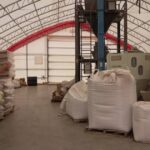SMITHTON, Pa. (AP) — Donald Trump was seated in a large barn in rural Pennsylvania on Monday, engaging with farmers, cracking jokes, but surprisingly listening more than speaking at his campaign event.
The outspoken former president showed unusual restraint at a roundtable discussion about China’s impact on the U.S. economy. The participants, comprised of farmers and manufacturers, expressed concerns about the potential loss of their livelihood. Trump was backed by large green tractors and a sign that read “Protect our food from China.”
The event held in Smithton, Pennsylvania, provided Trump with a platform to deliver his economic perspective in comparison to Vice President Kamala Harris. He highlighted the importance of imposing tariffs and increasing energy production to reduce costs. Trump specifically emphasized Harris overturning her commitment to ban fracking, a critical natural gas extraction method for Pennsylvania.
Trump also addressed the issue of John Deere, the manufacturer of the tractors behind him, which recently announced plans to move manufacturing operations to Mexico. Trump threatened the company with a 200% tariff if it proceeded with exporting jobs to Mexico instead of producing in the U.S.
“If they choose to build in the United States, no tariffs will be imposed,” he added.
Initially sticking to his signature themes, Trump acknowledged the 2020 election outcome as a “disgrace.” However, he shifted focus by allowing others to share their concerns and viewpoints.
Responding to a farmer’s comment about the closure of family farms, Trump inquired about the impact on overall production. While production levels have risen due to larger farms, there was a noticeable decline in smaller family-owned farms.
“I understand that, yes,” Trump responded with a hint of solemnity. He later humorously added, “I am not too concerned about the people around this table supporting me on Election Day, but you never know.”
When energy production was raised as a concern, Trump expressed surprise at the high energy dependence of farmers. Another participant highlighted Chinese-subsidized businesses, prompting Trump to advocate for tariffs as a solution.
After a participant praised him at the end of her comments, Trump responded with a simple, “Amen. I agree.”
Trump’s event strategy included promoting tariffs to appeal to the working-class demographic averse to free-trade agreements and job outsourcing. However, the event was not solely focused on showcasing his relatable side.
During a later media Q&A session, Trump displayed a more confrontational demeanor when questioned about how tariffs on manufacturers like John Deere could impact farmers. Criticizing Harris, he stated, “She is not the right choice for Pennsylvania.”
Later in the day, Trump plans to hold a rally in Indiana, Pennsylvania, aiming to secure support from conservative white working-class voters. As a pre-rally stop at a local market, Trump exhibited a softer side by purchasing popcorn and jokingly implying that if elected, he might order more from the Oval Office. Additionally, he surprised a woman paying for groceries by giving her a $100 bill, reducing her total expenditure by a hundred dollars.
Harris is scheduled to visit Pennsylvania on Wednesday.
Meanwhile, at a New York fundraiser, Harris’ running mate, Minnesota Gov. Tim Walz, emphasized the inadequacy of Trump’s energy approach, calling it a superficial solution that does not address climate change effectively. Walz cited climate change as a significant threat but also as an opportunity to enhance the economy, particularly by integrating renewable energy sources into agriculture.
Addressing Trump’s farming event, a spokesman for Harris campaign, Joseph Costello, criticized Trump’s favoritism toward wealthy corporations and foreign companies at the expense of family farmers. He highlighted the negative impacts of Trump’s policies on farm bankruptcies and trade relationships.
The Smithton event was hosted by the Protecting America Initiative, led by Richard Grenell and Lee Zeldin, focusing on highlighting Chinese influence on American farmlands and advocating for heightened awareness.
By the end of 2022, China held approximately 250,000 acres of U.S. land, a fraction of the total foreign-owned land. While Canada is the largest foreign landowner in the U.S., questions have been raised about foreign entities buying significant acreage near U.S. military installations.
Local farmer Rex Murphy expressed support for Trump in the area, emphasizing the need for less taxation and more economic freedom to drive growth.
“I want everything possible for the economy,” Murphy, 48, conveyed. “If he becomes president and does what he does, the impact will be significant.”
Written by Weissert from Washington. Contributions to this report were made by Didi Tang in Washington and Michelle L. Price in New York.






